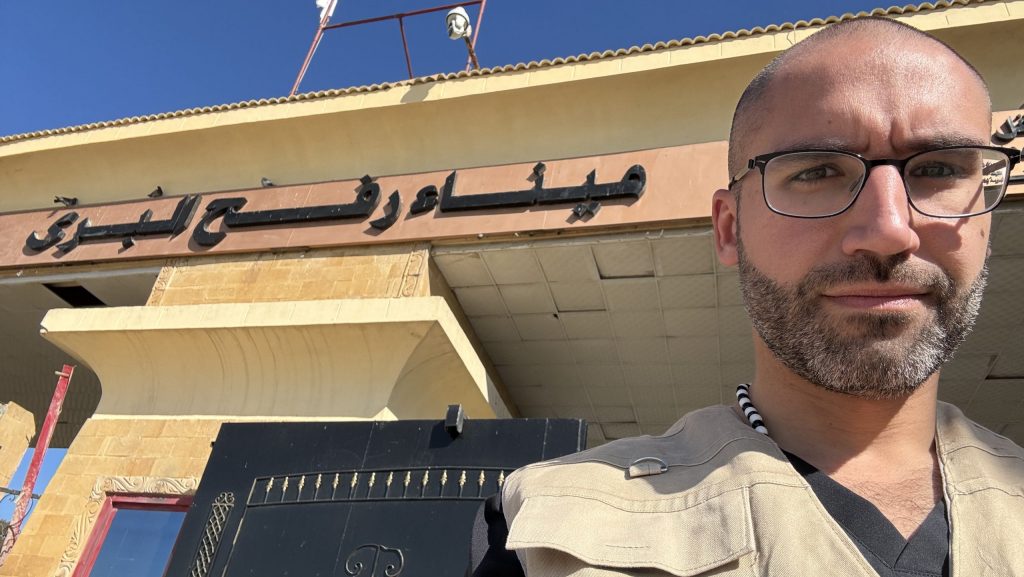Local doctor describes dire conditions in Gaza hospitals during medical mission last December
Robyn Vincent December 10, 2024More than half of Gaza’s hospitals are completely out of service due to Israeli bombardments, according to the United Nations.

Dr. Adam Fahs at the Rafah border crossing in Gaza in December 2023. Since then, the crossing on the Palestinian side has been demolished by the Israeli army.
“As winter approaches, the horror in Gaza continues to grind on with no end in sight.”
Those are the words of a United Nations official addressing the UN Security Council in November.
Israel’s war in Gaza, following the attacks last October led by Hamas, has reportedly claimed the lives of more than 44,000 Palestinians and 1,700 Israelis and foreign nationals, the UN reports.
Even before the war, life in Gaza was fragile due to the Israeli blockade and occupation. That blockade deeply affects health care access.
Recent research in The Lancet found that before the war, 35 hospitals operated at full capacity in Gaza. Those hospitals had roughly 3,400 beds for a population of over two million people.
Now, more than half of Gaza’s hospitals are completely out of service due to Israeli bombardments, according to the United Nations.
Still, those numbers do not reflect the magnitude of the problem, said Dr. Adam Fahs, a metro Detroit-based orthopedic surgeon and member of Doctors Against Genocide. He said the facilities that are still operating resemble small clinics rather than well-equipped medical facilities.
“These are ‘hospitals’ you can drive by and easily miss,” he said. “I don’t want people to think that these are major Level 1 trauma centers like we have here in the States.”
He said these clinics were already “not fully staffed, not fully functioning…supplies were missing.”
The Israeli blockade has forced doctors to make impossible decisions: “Now we have to figure out when we’re preparing someone for surgery, do we use sterile gloves for this person, or do we save that for another patient; is this knife blade really needed here? Or can we save this for someone else? These are all things that a hospital trying to take care of maimed and injured people shouldn’t have to be considering,” he said.
Fahs traveled to Gaza last December as the humanitarian crisis unfolded there. During his medical mission in Gaza, Fahs was uncertain he would return to the U.S. alive.
“I feel that maybe one of the reasons why God did bring me back was that I could share…my account of what happened there, because I don’t think people really appreciate and realize the extent of the destruction that’s happening.”
Use the media player above to hear the full conversation.
Trusted, accurate, up-to-date.
WDET strives to make our journalism accessible to everyone. As a public media institution, we maintain our journalistic integrity through independent support from readers like you. If you value WDET as your source of news, music and conversation, please make a gift today.
Author
-
 Robyn Vincent is the co-host of The Metro on WDET. She is an award-winning journalist, a lifelong listener of WDET, and a graduate of Wayne State University, where she studied journalism. Before returning home to Detroit, she was a reporter, producer, editor, and executive producer for NPR stations in the Mountain West, including her favorite Western station, KUNC. She received a national fellowship from Investigative Reporters and Editors for her investigative work that probed the unchecked power of sheriffs in Colorado. She was also the editor-in-chief of an alternative weekly newspaper in Wyoming, leading the paper to win its first national award for a series she directed tracing one reporter’s experience living and working with Syrian refugees.
Robyn Vincent is the co-host of The Metro on WDET. She is an award-winning journalist, a lifelong listener of WDET, and a graduate of Wayne State University, where she studied journalism. Before returning home to Detroit, she was a reporter, producer, editor, and executive producer for NPR stations in the Mountain West, including her favorite Western station, KUNC. She received a national fellowship from Investigative Reporters and Editors for her investigative work that probed the unchecked power of sheriffs in Colorado. She was also the editor-in-chief of an alternative weekly newspaper in Wyoming, leading the paper to win its first national award for a series she directed tracing one reporter’s experience living and working with Syrian refugees.
